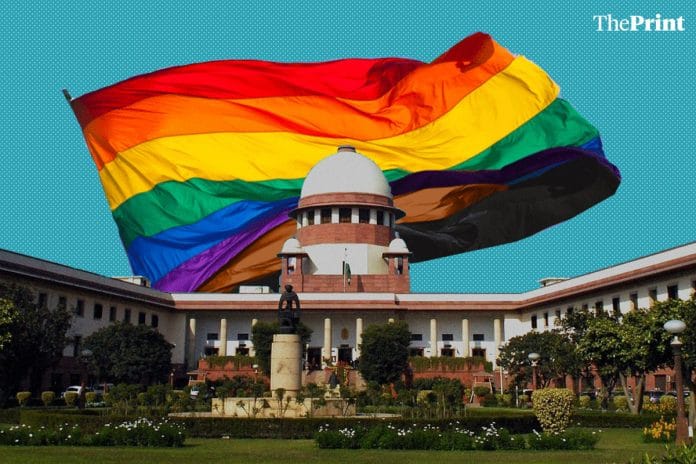The Supreme Court has struck down the contentious Section 377, which criminalised “unnatural sex”. In a victory for the LGBTQ community, the court said, “Section 377 results in discrimination and is violative of constitutional principles”.
ThePrint asks – Section 377 verdict: Is political class passing the buck of simple decisions to courts?
Queer liberation is only possible when casteism ends
 Grace Banu
Grace Banu
Founder & Director, Trans Rights Now Collective
As a Dalit transgender activist, I feel extremely happy with this favourable judgment. It is a payoff for a long relentless struggle.
However, let’s also remember that when the rich, upper-caste lesbians and gays go dancing at five-star hotels tonight, without the security guards stopping them, we continue to face state atrocities, harassments and violence in our day to day lives.
We face violence and discrimination not only from people outside the community, but struggle with casteism and transphobia at the hands of privileged LGBTQ people, who treat us as outcasts.
So let us celebrate and let us dance, but our fights are not over yet. Queer liberation is only possible when casteism ends, when the current state of fascism perishes, and when as Dalit transpeople we can proudly walk with dignity like our fellow citizens.
We should strengthen our fight against Cis-Brahmanical patriarchy.
Legal reform doesn’t necessarily trigger social reform, but it’s a welcome first step
 Saumya Saxena
Saumya Saxena
Legal Historian and Former consultant, Law Commission of India
A unanimous decision to read down Section 377 gives us hope, and yet one wonders why it should take the intervention of the highest court of the country to give legitimacy to the lives of so many individuals.
The decriminalisation of ‘homosexual sex’ between consenting adults marks a beginning, and can pave way for a more inclusive framework for family laws in India.
The 21st Law Commission of India’s paper on family law reform has already pre-empted some of the questions that will follow. For instance, it spoke of replacing words ‘mother’ and ‘father’ with gender-neutral terms like ‘parents’ in the Juvenile Justice (Care and Protection) Act 2015. This should enable same-sex couples to adopt. It makes further suggestions about ‘presumption of marriage’ for couples who have been cohabiting for a long time, even as it fell short of introducing civil partnerships.
Thus, the reading down of Section 377 now enables the enactment of some of these recommendations. While legal reform does not necessarily trigger social reform, it is definitely a welcome first step, particularly for movements that are unlikely to be endorsed by those we choose to recognise as ‘mainstream’.
The court has seen back and forth on the question, but at a time when our expectations from the legislature are less than limited, the past few years have seen many crucial questions of family law, intimacy, as well as intimate violence being pushed to courts and commissions, be it adultery, personal law, marital rape, privacy, or freedom of choice of partners. One can only hope these meaningful interventions will be internalised by all citizens.
Compared to problems of poverty & unemployment, gay rights’ issue is secondary
 Markandey Katju
Markandey Katju
Former Judge, Supreme Court of India
The Supreme Court has struck down Section 377 of the IPC, and rightly so. There is no good reason for making consensual homosexual relationship a criminal offence.
At the same time, I believe overemphasis on gay rights is uncalled for.
The major problem of the country is not establishing gay rights but addressing massive poverty, huge unemployment, widespread farmers’ distress, malnourishment, almost total lack of healthcare and good education for the masses, among other issues. Compared to these huge problems, the problem of gay rights is secondary.
To my mind overemphasis on gay rights is really a diversionary tactic to distract attention from the major problems facing the country.
I am sorry to sound a spoilsport or killjoy in this hour of celebration and hoopla, but I am compelled to throw some cold water on the faces of people who get carried away by emotions.
Also read: Sometimes homophobic, sometimes liberal: BJP’s uneven Section 377 journey
We respect SC verdict but most of us feel homosexual behaviour is deviation
 Rahul Easwar
Rahul Easwar
Hindu activist
All phobias are wrong because they are irrational. I lean to the Hindu Right, and at the same time, I am sensitive enough to the issues of our LGBTQ community.
Like eminent spiritual leader Sri Sri Ravi Shankar said, we shouldn’t discriminate against any person because of his/her sexual orientation. Pope Francis also had a similar take on this.
We in the Right-leaning cultural spectrum have always presented respectful differences in opinion. I concede there are some people who call it a disease or illness, but the majority of moderate Right-leaning thinkers feel that homosexual behaviour is a deviation not a disease. We don’t agree that it is a variation, but a deviation.
In the animal kingdom too, there are only a microscopic minority of animals who exhibit homosexual behaviour.
There is also a debate on whether the concept of sexual orientation can be seen in the context of nature vs nurture. People are arguing that homosexuality, to a large extent, is nurture-driven and can be “corrected”. In 40 states across the US, conversion therapy is still legal.
Politicians have to always balance political and legal correctness
 Monica Arora
Monica Arora
Advocate, Supreme Court
In a rare moment of unity, the ruling and the opposition parties, be it BJP, Congress, CPI(M), Rashtriya Lok Dal, Nationalist Congress Party (NCP), all have welcomed this decision and broadly agreed.
Times have changed and society has evolved. Following the privacy judgment in August last year, the Congress had urged the court to relook at Section 377 of the IPC. The CPI(M) had also stated and hoped that the SC would revise the said judgment and clarified that it always stood against the criminalisation of homosexual sex between consulting adults. Law minister Ravi Shankar Prasad had clarified the stand of the government stating that consensus needed to be built and any decision of the SC in line with the development and recognition of gay rights would be welcome. Rashtriya Lok Dal welcomed the stand as well.
We must realise that the political class, on the one hand, represents their constituency comprising voters, and on the other hand, has the responsibility of making the laws. Hence, it has to strike a balance between political and legal correctness. It has to consider the emotional, moral, religious and sentimental quotient of the society, and make (or strike down) laws.
Hence the affidavit submitted by the Government of India stated that the Centre will not contest the case of the petitioners if it was only concerned with the issue of criminalisation and not other aspects of Section 377 like marriage and inheritance.
Legislature passes the buck to judiciary when it sees no electoral gain in making an intervention
 Sanya Dhingra
Sanya Dhingra
Reporter, The Print
The Indian judiciary is often – sometimes rightly – accused of judicial overreach. The accusations mostly come from elected politicians. They look at a bunch of black-gowned, unelected men (despite the Supreme Court having three female judges, the representation of women remains alarmingly low in Indian courts), who they have to willy-nilly be answerable to, with considerable disdain.
Yet, every time they are confronted with uncomfortable questions, they have no qualms about turning to the courts for judicial intervention. Is reading down of an archaic, colonial law, which criminalises a large number of innocent citizens, something that the legislature could not do? Was it not given several opportunities to do so? The legislature passes the buck to the judiciary when either it sees no electoral gain in making an intervention or it is not sure of the electoral fallout of such an intervention.
Women campaigning against the practice of female genital mutilation, for example, were routinely turned away by elected politicians because they are not a significant vote bank. These women have now taken their plea to the Supreme Court. Fed up of politicians’ false, misleading promises, women campaigning against triple talaq, too, finally got justice from the judiciary. But sniffing political gain in “liberating” Muslim women, who had already won their battle in the court, the ruling BJP readily came up with a bill criminalising an already invalidated practice.
More recently, it jumped in to overturn the Supreme Court order diluting the SC/ST Atrocity Act. There is, of course, merit in doing so. But the question to ask is, would the government have done so if national polls were not months away? And since unlike the SC/ST vote bank, the LGBTQ community in India would have never been a vote bank for any party, isn’t it safe to assume that they could have expected justice only from a bunch of unelected men and women with no electoral considerations?
Compiled by Fatima Khan, journalist at ThePrint. You can follow her on twitter @khanthefatima.






